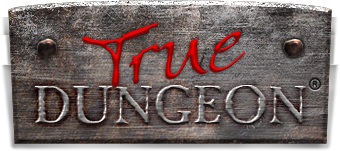TJRat wrote: Monsters reacting to taunting or big hits are a staple of our experience. DMs deliberately targeting a player due to low AC, saving throw, etc. should not be.
There's a big white 20-sided die provided on the table right there - DMs should use it when selecting targets in the absence of any guidance in the module or situations listed above.
Eh.
My monsters sometimes taunt players but players rarely take the bait.
And while occasionally my monsters will react to taunting, most of the time they know better than that. Also, I generally ignore most taunting b/c most of the time it is someone trying to manipulate/trick the DM/monsters.
I do think that "taunting" might be more interesting and interactive when there is an NPC.
So do you want monsters to be attacking based on DM notes? On randomness? Or due to manipulation and taunting?
Because if you want the monsters to be following the script or attacking randomly, then they definitely should NOT respond to taunting!
Responding to big hits IS valuable because it is a clear indication of damage/threat potential, as well as player skill (which isn't captured on the party card).
Second gripe (only because I hope it gets through to the DM): When requiring a player to make a saving throw, tell them what it's for. While trying to keep our Barbie from going full rage, I was constantly called to the table to roll a saving throw. When I asked about the nature of the attack, I was told to 'just roll - save time.'
it's my fault for not putting my foot down, but there's a compelling argument about saving time. However, with an amethyst and a violet prism, in retrospect I believe I might have been able to counter the attack.
In True Grind, I often ask players to "just roll" in order to save time.
In fact, one of my pet peeves is: Monster attacks, deals X damage, and requires a saving throw. Way too many players waste valuable time fidgeting with their HP counters, and only then rolling the die. It is far more preferable for them to roll the die first, and then deal with the HP adjustment afterwards.
Also, while you may know who in your party is what class, in Grind that is not often the case. So I might be attacking you (point to random person whose class I don't know) so when I ask you to roll a saving throw, it REALLY helps if you can say what class you are. I often explicitly ask players to announce their class when rolling but even then, maybe players don't.
Now when I ask players to roll a saving throw I will usually tell them if it is Fortitude/Reflex/Save or if the roll is for something else (to get through magic resistance, or I am letting the player roll the monster's attack against them).
Now some special attacks are more obvious. If you failed the save against the spider, I would explain that its poison seeps into you, making you feel sluggish and slow. At that point, if someone wants to use an Anti-toxin or says "hey I'm immune b/c of the Medallion of Greyhawk," that's fine. Sometimes, I might explicitly say make a Fort save vs poison.
However, there are other times when the exact attack form is intentionally not obvious. Say, the Lamia touches you and drains your wisdom. TD currently doesn't have tokens dealing with ability drain, but I intentionally designed the Lamia so that a Remove Curse would remove it. But part of the built-in "puzzle" was trying to figure out what it was. I recall Druegar asking what the source was and I told him "you aren't quite sure" and suggesting that he experiment (which he didn't). In contrast, a few groups actually did try Remove Curse and were pleased when they solved that little puzzle. I even saw one group use a Censer of Sacrifice twice, burning 200 GP to restore the Cleric and Druid.
If I simply said "it is a curse," that kind of ruins the mini-puzzle and gives players information that they should not have. If someone had a Shirt of Health then sure, they could say "I am immune to disease, does that make a difference?" And I could tell them that they are still affected for one reason or another. But the average player should not automatically know whether it was poison/disease/curse/etc.
A similar situation was the Aboleth. Those familiar with the creature might recall that it uses Dominate Person effects (which are not Charms). Explicitly saying "this is or is not a Charm" would reveal too much information. In addition, there were occasions when the Aboleth would be able to attempt Dominate when it was "offscreen" (if you had killed the Lamia but had not yet defeated the Purple Worm or the Mind Flayer). So hidden monsters were essentially attacking from offscreen. Revealing to much about the "mysterious attack or saving throw" would have provided too much information.
And the classic example is when you have a player make a Will save versus illusion. It is way too spoiler-ific to tell them to make a saving throw versus ILLUSION. Instead, just have them make a Will save for some mysterious purpose.
I would say "if you have a token that might be relevant, mention the token." But in Grind at least, I exhaustively go through the potential tokens several times beforehand and a lot of the time the information given (or information omitted) is carefully designed for a reason.
So just about how you say there are cases where a monster shouldn't be able to know things, there are way more situations where a player shouldn't have 100% knowledge of the details of a particular attack.





